Python学习---JSONP学习180130
同源策略机制
同源:协议://IP:端口【协议,域名,端口相同】
跨域:知道对方接口,同时对方返回的数据也必须是Jsonp格式的
问题描述:Ajax跨域请求数据的时候,实际浏览器已经拿到数据,但是浏览器由于同源策略隐藏了这些内容,不给我们看这些数据。换言之,Ajax不能跨域请求数据。
问题解决:<script src="">
有src属性的标签都可以跨域请求数据,这也就是为什么img我们可以引用别的网站的图片


JSONP的原型:创建一个回调函数,然后在远程服务上调用这个函数并且将JSON 数据形式作为参数传递,完成回调。
JSONP一定是GET请求
JSONP就是用来跨域的,没有用XmlHttpRequest对象和Ajax来发送请求,是一个伪造的请求。
JSONP的本质就是动态的创建script标签,然后吧请求的url放入到自己的src标签里面【你请求的URL就是他的src】,拿到数据后[本地的函数接收并处理]最后动态的删除掉。再次发送则再次创建script标签
<script src=''127.0.0.1:8080/XXX.do''>
例如接收的数据是: li([1,2,3,4,5]) --->这里返回的数据li是个函数
function li(data){ // 本地函数
console.log(data)
}
JSONP的约定: 用函数名括起来加上数据 函数名([数据])
Jsonp自己实现JSONP
<!DOCTYPE html>
<html lang="en">
<head>
<meta charset="UTF-8">
</head>
<body>
<input type="button" onclick="jsonpRequest();" value="跨域请求jsonp">
</body>
<script>
tag = null;
function jsonpRequest() {
tag = document.createElement('script');
tag.src = 'http://www.jxntv.cn/data/jmd-jxtv2.html?callback=list&_=1454376870403';
document.head.appendChild(tag); // 添加script到head里面
}
// 接收返回的JSONP的数据
function list(data) {
console.log(data);
document.head.removeChild(tag);
}
</script>
</html>
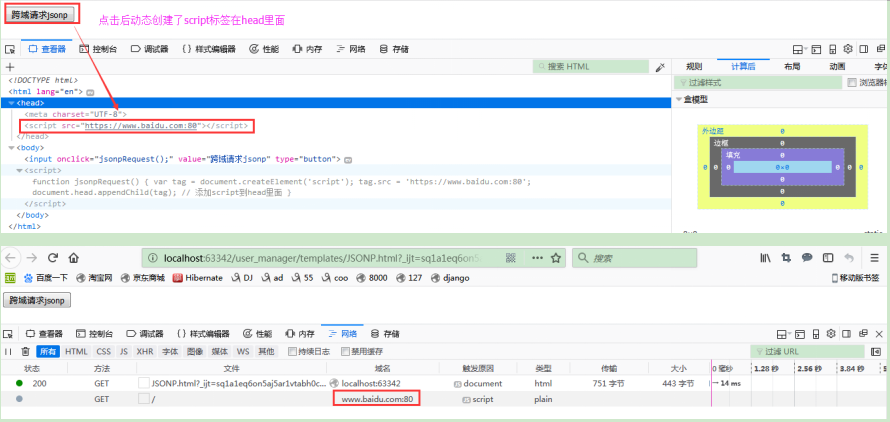


Jsonp实例一: 利用script标签的src属性
padding: 就是函数,将数据放在在函数内,然后打包发送给前台、
缺点:前台script里必须要有一个函数,处理一个写一个函数,因为本质是利用函数接收参数
正确应该动态添加script标签和内容
settigs.py:
'DIRS': [os.path.join(BASE_DIR, 'templates')], # 设置templates的路径为Django以前版本
# 'DIRS': [], # 注释掉该行,此为Django 2.0.1最新版本
# 'django.middleware.csrf.CsrfViewMiddleware',
...省略默认配置
STATIC_URL = '/static/'
TEMPLATE_DIRS = (os.path.join(BASE_DIR, 'templates'),) # 原配置
# 静态资源文件
STATICFILES_DIRS = (os.path.join(BASE_DIR, "statics"),) # 现添加的配置,这里是元组,注意逗号
templates/ajax_jquery.html
<!DOCTYPE html>
<html lang="en">
<head>
<meta charset="UTF-8">
</head>
<script src="/static/jquery-3.2.1.js"></script>
<script>
function test(data) {
console.log(data)
}
</script>
{#跨站请求内容#}
<script src="http://127.0.0.1:8081/jquery_ajax_test/"></script>
</html>
mysite2/urls.py
from django.contrib import admin
from django.urls import path
from blog import views
from django.conf.urls import url
urlpatterns = [
# Jquery_Ajax
url(r'ajax-jquery/', views.ajax_jquery),
# jquery_ajax_test
url(r'jquery_ajax_test/', views.jquery_ajax_test),
]
views.py
from django.shortcuts import render, HttpResponse
# Jquery --> ajax
def ajax_jquery(request):
return render(request, 'ajax_jquery.html')
# Jquery --> ajax
import json
def jquery_ajax_test(request):
print('request.POST', request.POST)
# return HttpResponse('hello') # 错误,此时跨域返回给scrip标签一个未定义的hello变量
# return HttpResponse('var hello') # 正确,此时跨域返回给scrip标签一个定义但没有内容的hello变量
return HttpResponse('test("hello")')
页面显示:

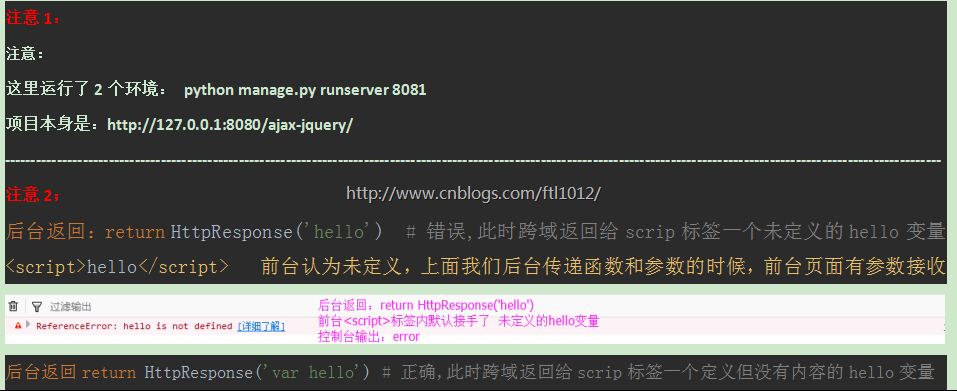
动态的创建script的JSonp实例:
settigs.py:
'DIRS': [os.path.join(BASE_DIR, 'templates')], # 设置templates的路径为Django以前版本
# 'DIRS': [], # 注释掉该行,此为Django 2.0.1最新版本
# 'django.middleware.csrf.CsrfViewMiddleware',
...省略默认配置
STATIC_URL = '/static/'
TEMPLATE_DIRS = (os.path.join(BASE_DIR, 'templates'),) # 原配置
# 静态资源文件
STATICFILES_DIRS = (os.path.join(BASE_DIR, "statics"),) # 现添加的配置,这里是元组,注意逗号
templates/ajax_jquery.html
<!DOCTYPE html>
<html lang="en">
<head>
<meta charset="UTF-8">
</head>
<body>
<button onclick="f()">submit</button>
</body>
<script src="/static/jquery-3.2.1.js"></script>
{#动态跨站请求内容#}
<script>
function addScriptTag(src){
var script = document.createElement('script');
script.setAttribute("type","text/javascript");
script.src = src;
document.body.appendChild(script);
{# document.body.removeChild(script); #}
}
function SayHi(arg){
alert("Hello " + arg)
}
function f(){
addScriptTag("http://127.0.0.1:8081/jquery_ajax_test/?callback=SayHi")
}
</script>
</html>
mysite2/urls.py
from django.contrib import admin
from django.urls import path
from blog import views
from django.conf.urls import url
urlpatterns = [
# Jquery_Ajax
url(r'ajax-jquery/', views.ajax_jquery),
# jquery_ajax_test
url(r'jquery_ajax_test/', views.jquery_ajax_test),
]
views.py
from django.shortcuts import render, HttpResponse
# Jquery --> ajax
def ajax_jquery(request):
return render(request, 'ajax_jquery.html')
# Jquery --> ajax
def jquery_ajax_test(request):
print('request.GET', request.GET)
func = request.GET.get('callbacks', None)
print('func;', func)
return HttpResponse("%s('world')" % func)
页面显示:
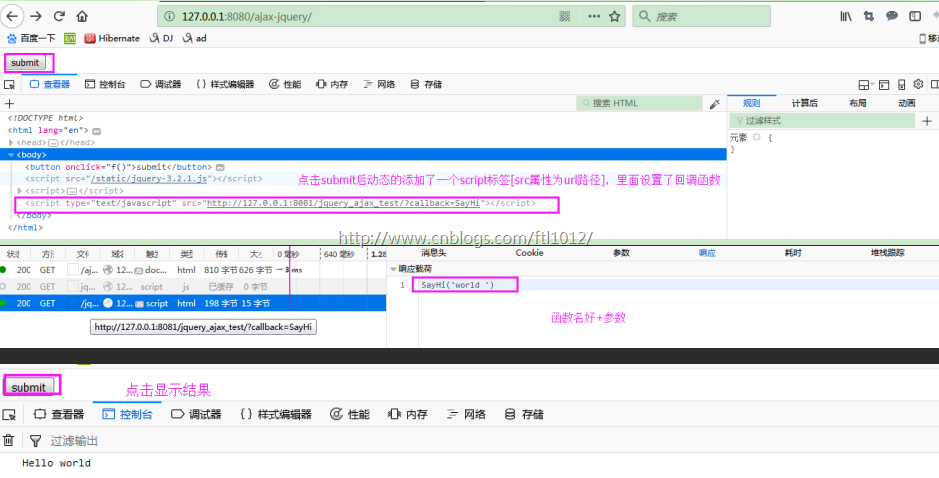
注意:
这里运行了2个环境: python manage.py runserver 8081
项目本身是:http://127.0.0.1:8080/ajax-jquery/
jQuery对JSONP的实现
1. 使用Jquery定义的回调函数名:
$.getJSON("http://127.0.0.1:8081/jquery_ajax_test?callback=?",function(arg){
console.log("successfully, hello " + arg)
});
注意的是在url的后面必须添加一个callback参数,这样getJSON方法才会知道是用JSONP方式去访问服务,callback后面的那个问号是内部自动生成的一个回调函数名。
2. 使用自定义的函数名:
形式一: 自定义函数 + 调用指定函数 【不推荐】
function SayHi() {
...
}
$.ajax({
url:"http://127.0.0.1:8002/get_byjsonp",
dataType:"jsonp", # 要求服务器返回一个JSONP格式的数据,一个函数套着一个数据形式,否则返回原类型
jsonp: 'callback',
jsonpCallback:"SayHi"
});
注意:jsonp: 'callback' + jsonpCallback:"SayHi" --拼凑一个键值对发送过去----> 'callback':'SayHi' 形式二:自定义函数 + 不用指定函数名 【推荐】
$.ajax({
url:"http://127.0.0.1:8002/get_byjsonp",
dataType:"jsonp", //必须有,告诉server,这次访问要的是一个jsonp的结果。
jsonp: 'callback', //jQuery帮助随机生成的:callback="wner"
success:function(data){ # 接收后台传递过来的data数据即可
alert(data)
}
});
getJSON之使用JQuery定义的函数名--实例
settigs.py:
'DIRS': [os.path.join(BASE_DIR, 'templates')], # 设置templates的路径为Django以前版本
# 'DIRS': [], # 注释掉该行,此为Django 2.0.1最新版本
# 'django.middleware.csrf.CsrfViewMiddleware',
...省略默认配置
STATIC_URL = '/static/'
TEMPLATE_DIRS = (os.path.join(BASE_DIR, 'templates'),) # 原配置
# 静态资源文件
STATICFILES_DIRS = (os.path.join(BASE_DIR, "statics"),) # 现添加的配置,这里是元组,注意逗号
templates/ajax_jquery.html
<!DOCTYPE html>
<html lang="en">
<head>
<meta charset="UTF-8">
<title>Title</title>
</head>
<body>
<button onclick="f()">submit</button>
</body>
<script src="/static/jquery-3.2.1.js"></script>
{# jQuery对JSONP的实现#}
<script type="text/javascript">
function f() {
$.getJSON("http://127.0.0.1:8081/jquery_ajax_test?callback=?",function(arg){
console.log("successfully, hello " + arg)
});
}
</script>
</html>
mysite2/urls.py
from django.contrib import admin
from django.urls import path
from blog import views
from django.conf.urls import url
urlpatterns = [
# Jquery_Ajax
url(r'ajax-jquery/', views.ajax_jquery),
# jquery_ajax_test
url(r'jquery_ajax_test/', views.jquery_ajax_test),
]
views.py
from django.shortcuts import render, HttpResponse
# Jquery --> ajax
def ajax_jquery(request):
return render(request, 'ajax_jquery.html')
# Jquery --> ajax
def jquery_ajax_test(request):
print('request.GET', request.GET)
func = request.GET.get('callback', None)
print('func;', func)
return HttpResponse("%s('world 2020')" % func)
页面显示:
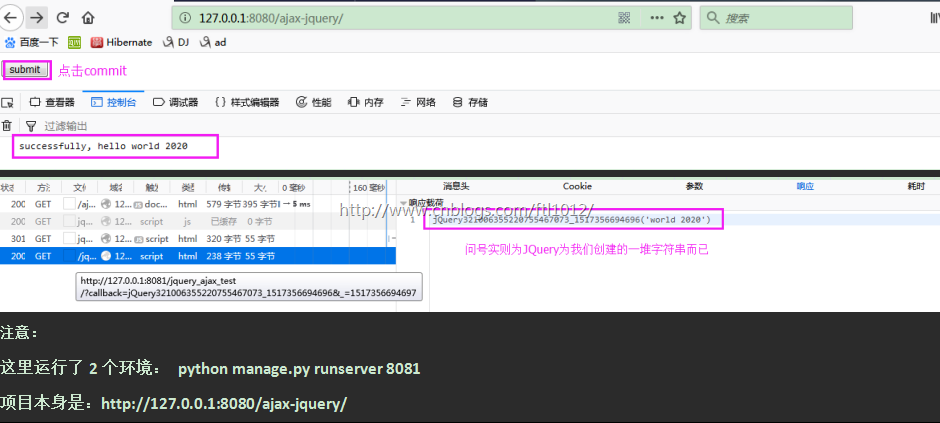
getJSON之使用自定义的函数名--实例:
settigs.py:
'DIRS': [os.path.join(BASE_DIR, 'templates')], # 设置templates的路径为Django以前版本
# 'DIRS': [], # 注释掉该行,此为Django 2.0.1最新版本
# 'django.middleware.csrf.CsrfViewMiddleware',
...省略默认配置
STATIC_URL = '/static/'
TEMPLATE_DIRS = (os.path.join(BASE_DIR, 'templates'),) # 原配置
# 静态资源文件
STATICFILES_DIRS = (os.path.join(BASE_DIR, "statics"),) # 现添加的配置,这里是元组,注意逗号
templates/ajax_jquery.html
<!DOCTYPE html>
<html lang="en">
<head>
<meta charset="UTF-8">
<title>Title</title>
</head>
<body>
<button onclick="f()">submit</button>
</body>
<script src="/static/jquery-3.2.1.js"></script>
{# jQuery对JSONP的实现#}
<script type="text/javascript">
$.getJSON("http://127.0.0.1:8081/jquery_ajax_test?callback=?",function(arg){
console.log("successfully, hello " + arg)
});
</script>
</html>
mysite2/urls.py
from django.contrib import admin
from django.urls import path
from blog import views
from django.conf.urls import url
urlpatterns = [
# Jquery_Ajax
url(r'ajax-jquery/', views.ajax_jquery),
# jquery_ajax_test
url(r'jquery_ajax_test/', views.jquery_ajax_test),
]
views.py
from django.shortcuts import render, HttpResponse
# Jquery --> ajax
def ajax_jquery(request):
return render(request, 'ajax_jquery.html')
# Jquery --> ajax
def jquery_ajax_test(request):
print('request.GET', request.GET)
func = request.GET.get('callback', None)
print('func;', func)
return HttpResponse("%s('world 2020')" % func)
页面显示:
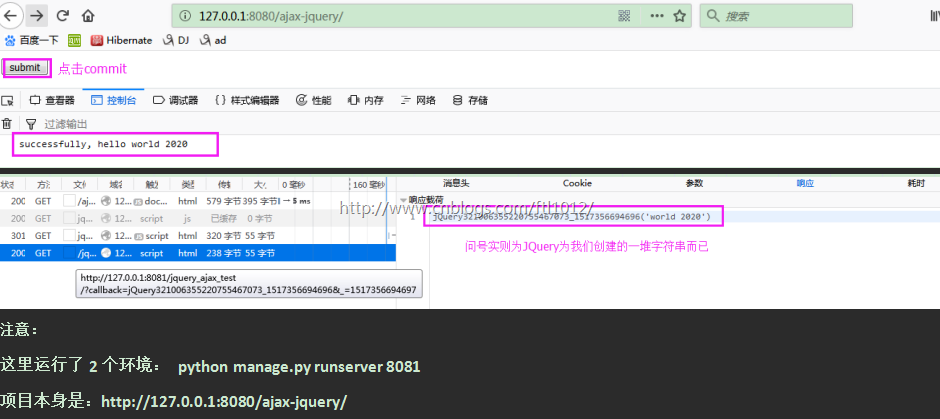
.ajax 跨域请求之指定函数
settigs.py:
'DIRS': [os.path.join(BASE_DIR, 'templates')], # 设置templates的路径为Django以前版本
# 'DIRS': [], # 注释掉该行,此为Django 2.0.1最新版本
# 'django.middleware.csrf.CsrfViewMiddleware',
...省略默认配置
STATIC_URL = '/static/'
TEMPLATE_DIRS = (os.path.join(BASE_DIR, 'templates'),) # 原配置
# 静态资源文件
STATICFILES_DIRS = (os.path.join(BASE_DIR, "statics"),) # 现添加的配置,这里是元组,注意逗号
templates/ajax_jquery.html
<!DOCTYPE html>
<html lang="en">
<head>
<meta charset="UTF-8">
<title>Title</title>
</head>
<body>
<button onclick="f()">submit</button>
</body>
<script src="/static/jquery-3.2.1.js"></script>
{# jQuery对JSONP的实现#}
<script type="text/javascript">
function SayHi() {
console.log("hello, json")
}
function f() {
$.ajax({
url:"http://127.0.0.1:8081/jquery_ajax_test",
dataType:"jsonp",
jsonp: 'callback',
jsonpCallback:"SayHi"
});
}
</script>
</html>
mysite2/urls.py
from django.contrib import admin
from django.urls import path
from blog import views
from django.conf.urls import url
urlpatterns = [
# Jquery_Ajax
url(r'ajax-jquery/', views.ajax_jquery),
# jquery_ajax_test
url(r'jquery_ajax_test/', views.jquery_ajax_test),
]
views.py
from django.shortcuts import render, HttpResponse
# Jquery --> ajax
def ajax_jquery(request):
return render(request, 'ajax_jquery.html')
# Jquery --> ajax
def jquery_ajax_test(request):
print('request.GET', request.GET)
func = request.GET.get('callback', None)
return HttpResponse("%s('world 2020')" % func) # func为[],因为根本不需要调用,前台已定义好
页面显示:

Python学习---JSONP学习180130的更多相关文章
- Python 装饰器学习
Python装饰器学习(九步入门) 这是在Python学习小组上介绍的内容,现学现卖.多练习是好的学习方式. 第一步:最简单的函数,准备附加额外功能 1 2 3 4 5 6 7 8 # -*- c ...
- Requests:Python HTTP Module学习笔记(一)(转)
Requests:Python HTTP Module学习笔记(一) 在学习用python写爬虫的时候用到了Requests这个Http网络库,这个库简单好用并且功能强大,完全可以代替python的标 ...
- 从Theano到Lasagne:基于Python的深度学习的框架和库
从Theano到Lasagne:基于Python的深度学习的框架和库 摘要:最近,深度神经网络以“Deep Dreams”形式在网站中如雨后春笋般出现,或是像谷歌研究原创论文中描述的那样:Incept ...
- Comprehensive learning path – Data Science in Python深入学习路径-使用python数据中学习
http://blog.csdn.net/pipisorry/article/details/44245575 关于怎么学习python,并将python用于数据科学.数据分析.机器学习中的一篇非常好 ...
- (转载)Python装饰器学习
转载出处:http://www.cnblogs.com/rhcad/archive/2011/12/21/2295507.html 这是在Python学习小组上介绍的内容,现学现卖.多练习是好的学习方 ...
- python网络爬虫学习笔记
python网络爬虫学习笔记 By 钟桓 9月 4 2014 更新日期:9月 4 2014 文章文件夹 1. 介绍: 2. 从简单语句中開始: 3. 传送数据给server 4. HTTP头-描写叙述 ...
- Python装饰器学习
Python装饰器学习(九步入门) 这是在Python学习小组上介绍的内容,现学现卖.多练习是好的学习方式. 第一步:最简单的函数,准备附加额外功能 ? 1 2 3 4 5 6 7 8 # -*- ...
- python数据分析入门学习笔记
学习利用python进行数据分析的笔记&下星期二内部交流会要讲的内容,一并分享给大家.博主粗心大意,有什么不对的地方欢迎指正~还有许多尚待完善的地方,待我一边学习一边完善~ 前言:各种和数据分 ...
- Python的基础学习(第二周)
模块初始 sys模块 import sys sys.path #打印环境变量 sys.argv#打印该文件路径 #注意:该文件名字不能跟导入模块名字相同 os模块 import os cmd_res ...
随机推荐
- 让字体在div容器中垂直居中
1. 只显示一行数据的话: 给容器设置height和line-height,并使两个值相等,再加上over-flow:hidden .test{ height:40px; line-height:40 ...
- 入门系列之在Ubuntu上安装Drone持续集成环境
欢迎大家前往腾讯云+社区,获取更多腾讯海量技术实践干货哦~ 本文由小铁匠米兰的v 发表于云+社区专栏 介绍 Drone是一个流行的持续集成和交付平台.它集成了许多流行的版本控制存储库服务,如GitHu ...
- 基于RedHat6.5的Greenplum环境配置
安装Greenplum的时候遇到了很多坑,在此记录下 欢迎园友补充问题,共同研究解决! 安装说明 1.环境说明 操作系统:Red hat 6.5 64 位 2.配置规范 2.1基本说明 greenpl ...
- 在ubuntu下使用visual studio code编写python
感觉有了visual studio code之后,不管编写什么语言的代码都可以,简单安装对应的语言插件即可. 这不轮到了最近比较热的python语言,蹭着AI的热度,python语言成为了工程师们又一 ...
- 吴恩达《深度学习》第二门课(3)超参数调试、Batch正则化和程序框架
3.1调试处理 (1)不同超参数调试的优先级是不一样的,如下图中的一些超参数,首先最重要的应该是学习率α(红色圈出),然后是Momentum算法的β.隐藏层单元数.mini-batch size(黄色 ...
- Node.js之Console用法小结
/** * Created by city--online on 16/3/9. */ //console.time()和console.timeEnd()输出中间代码的执行时间(注意:time和ti ...
- Rsyslog+ELK日志分析系统
转自:https://www.cnblogs.com/itworks/p/7272740.html Rsyslog+ELK日志分析系统搭建总结1.0(测试环境) 因为工作需求,最近在搭建日志分析系统, ...
- SQL Serever学习9——基础查询语句
SQL语言概述 SQL是结构化查询语言(Structure Query Language),1974年提出,1979年被IBM实现,SQL语言已经成为关系型数据库的标准语言. 包括: DDL数据定义语 ...
- [javaSE] 网络编程(URL)
获取URL对象,new出来,构造参数:String的路径 调用URL对象的getProtocal()方法,获取协议 调用URL对象的getHost()方法,获取主机 调用URL对象的getPath() ...
- 集合框架以及Map(一)
集合又称容器,编程思想中对其的定义为持有对象 我们在使用集合或者数组时得到最多的异常就是数组下表越界异常 Java.lang.ArrayIndexOutOfBoundsException这篇文章我们不 ...
